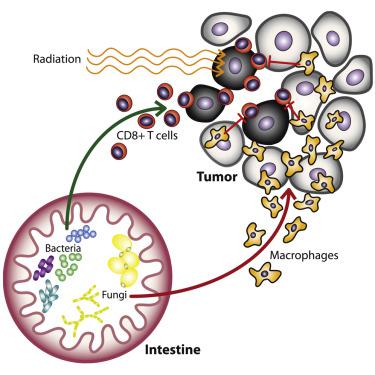Cancer Cell ( IF 50.3 ) Pub Date : 2021-07-29 , DOI: 10.1016/j.ccell.2021.07.002 Stephen L Shiao 1 , Kathleen M Kershaw 2 , Jose J Limon 3 , Sungyong You 4 , Junhee Yoon 4 , Emily Y Ko 5 , Jlenia Guarnerio 5 , Alka A Potdar 3 , Dermot P B McGovern 3 , Shikha Bose 6 , Tahir B Dar 5 , Paul Noe 5 , Jung Lee 5 , Yuzu Kubota 5 , Viviana I Maymi 5 , Madison J Davis 5 , Regina M Henson 5 , Rachel Y Choi 5 , Wensha Yang 5 , Jie Tang 7 , Matthew Gargus 3 , Alexander D Prince 3 , Zachary S Zumsteg 5 , David M Underhill 8

|
Studies suggest that the efficacy of cancer chemotherapy and immunotherapy is influenced by intestinal bacteria. However, the influence of the microbiome on radiation therapy is not as well understood, and the microbiome comprises more than bacteria. Here, we find that intestinal fungi regulate antitumor immune responses following radiation in mouse models of breast cancer and melanoma and that fungi and bacteria have opposite influences on these responses. Antibiotic-mediated depletion or gnotobiotic exclusion of fungi enhances responsiveness to radiation, whereas antibiotic-mediated depletion of bacteria reduces responsiveness and is associated with overgrowth of commensal fungi. Further, elevated intratumoral expression of Dectin-1, a primary innate sensor of fungi, is negatively associated with survival in patients with breast cancer and is required for the effects of commensal fungi in mouse models of radiation therapy.
中文翻译:

共生细菌和真菌差异调节肿瘤对放射治疗的反应
研究表明,癌症化学疗法和免疫疗法的功效受肠道细菌的影响。然而,微生物组对放射治疗的影响尚不清楚,而且微生物组不仅仅包括细菌。在这里,我们发现肠道真菌在乳腺癌和黑色素瘤小鼠模型中调节辐射后的抗肿瘤免疫反应,并且真菌和细菌对这些反应具有相反的影响。抗生素介导的真菌消耗或无菌排除增强了对辐射的反应性,而抗生素介导的细菌消耗降低了反应性,并与共生真菌的过度生长有关。此外,Dectin-1(真菌的主要先天传感器)的肿瘤内表达升高,


























 京公网安备 11010802027423号
京公网安备 11010802027423号